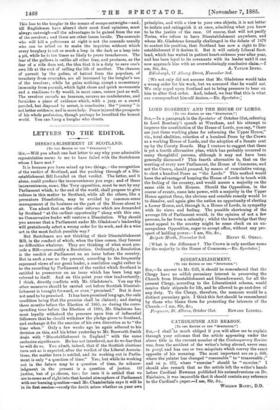LORD ROSEBERY AND THE HOUSE OF LORDS. [TO THE EDITOR
OF THE "Hpaoriroa."] Sin,—In a paragraph in the Spectator of October 31st, referring to Lord Rosebery's speech at Wrexham, and his attempt to improve the constitution of the House of Lords, you say, " there are just three working plans for reforming the Upper House," viz., total abolition, selection of a hundred Peers by the Crown as a working House of Lords, and the adoption of a Senate sent up by the County Boards. May I venture to suggest that there is yet a fourth alternative plan, which has probably occurred to many thoughtful persons, although it may not have been generally discussed ? This fourth alternative is, that on the meeting of every new Parliament, the House of Commons, and not the Crown, should proceed, by means of cumulative voting, to elect a hundred Peers as " the Lords." This method would have the advantage of keeping the House of Lords in touch with the feeling of the country, and would assure a majority on the same side in both Houses. Should the Opposition, in the course of events, come into power, with a majority in the Upper House against them, the obvious and sensible remedy would be to dissolve, and again give the nation an opportunity of electing a Lower House, and, through it, a House of Lords, in sympathy with its views and feeling. The possible shortening of the average life of Parliament would, in the opinion of not a few persons, be far from a calamity ; whilst the knowledge that they must appeal to the country might be some check on an un- scrupulous Opposition, eager to accept office, without any pro- spect of holding power.—I am, Sir, &c., Reigate Heath, November 3rd. HENRY G. OHRLY.
[W hat is the difference P The Crown is only another name for the majority in the House of Commons.—En. Spectator.]














































 Previous page
Previous page